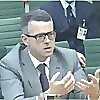
Ludic Geopolitics
534 FOLLOWERS
We are a group of researchers from the universities of Portsmouth, Exeter and Royal Holloway, looking at the relationship between war games, childhood and play. On this blog, we share our thoughts and latest research, focussing on how contemporary geopolitics are expressed and enacted through play.
Ludic Geopolitics
3y ago
The following is a blog post by undergraduate students from UoP’s Geographies of Children and Young People module.
Many of you might want to put the idea of child soldiers to the back of your mind or not be aware of the severity of the topic. Surprisingly, there are estimated to be over 300,000 child soldiers globally. The United Nations definition states that any child under the age of 18 years-old that is either associated or partaking in armed conflict, is categorised as a child soldier. This raises the question of whether child soldiers should be classed as victims of war or cr ..read more
Ludic Geopolitics
3y ago
Following on from our earlier re-blog of David Buckingham’s insightful piece on the role of media literacy in response to fake news, here is his latest piece focusing on the matter of media bias.
David Buckingham
Bias – along with related ideas like objectivity, impartiality and balance – is a staple issue in public debates about media, and in media literacy education. Yet in the wake of the Brexit referendum campaign, the victory of Donald Trump, and the attacks on the Labour Party leader Jeremy Corbyn, many have argued that we are entering a ‘post-truth’ era. In this context, is bias ..read more
Ludic Geopolitics
3y ago
Growing concerns about ‘fake news’ have led to calls for young people to be taught critical media literacy skills. Yet while media literacy would obviously be useful, it isn’t enough to address the problem. Media educators need to frame the issue more broadly, and join forces with those calling for media reform. My apologies for […]
via Fake news: is media literacy the answer? — David Buckingham ..read more
Ludic Geopolitics
3y ago
Article in the Orlando Sentinel
As we’ve been finding out through our research, many parents question whether they should discuss world events with their children, or if it’s best to just to try to shield them from worrying events all together. As Stephens (1995, p14) notes in her discussion of the sentimentalisation of childhood, our ideal conception of the child is one founded on innocence, with no engagement with matters of sex, money and politics.
“Modern children are supposed to be segregated from the harsh realities of the adult world and ..read more
Ludic Geopolitics
3y ago
This morning’s #Brexit news gives pause for thought as I put together the material for a new third year geography unit we’re launching this coming academic year: Geographies of Children and Young People. An understanding of young people’s agency and participation sits at the core of this unit. Polls from a variety of sources show […]
via Young People and the EU Referendum — materialsensibilities ..read more
Ludic Geopolitics
3y ago
Hot on the heels of the first academic publication arising from our Ludic Geopolitics project is a chapter on ‘Ludic Geographies’ in the Evans and Horton edited collection Play and Recreation, Health and Wellbeing. This collection is volume 9 of the Living Reference Work Geographies of Children and Young People edited by Tracey Skelton.
To whet your appetite:
Abstract
In many ways, twenty-first century (western) childhood may be characterized by a cacophony of moral panics. Spatiality is pertinent, if not central, to these moral panics, not least those conce ..read more
Ludic Geopolitics
3y ago
Children from the village of Mosso in Piedmont (Italy), have launched a crowdfunding campaign to raise €3 million to buy Budelli island, an uncontaminated paradise between the bigger islands of Sardinia and Corsica. The island, part of La Maddalena archipelago, is famous for its pink sandy beaches and is considered one of the most beautiful islands of the Mediterranean sea.
Image source: Facebook ‘Non si s-Budelli l’Italia’ (here)
In 2013, the island was bought by a New Zealand banker, Michael Harte, for €2.94 million . His plan was to turn the island into an open-air history museum. How ..read more
Ludic Geopolitics
3y ago
A guest blog post by Andreas Haggman
The Weston Library in Oxford is currently exhibiting a selection of its Playing with History collection of historical board games. The games on display span across some of the most eventful periods of the mid-late 19th and early 20th centuries, especially for Britain. For this reason, the games are not only supremely interesting artefacts in themselves, but also provide useful insight into contemporary attitudes towards the pressing economic, geopolitical and strategic issues of the time.
Reflecting Britain’s unquestionable position as the leading worl ..read more
Ludic Geopolitics
3y ago
The start of the new year saw the first academic publication arising from our ESRC funded Ludic Geopolitics project. This is a chapter entitled ‘Ludic – or playful – Geopolitics’ in the Benwell and Hopkins edited collection Children, Young People and Critical Geopolitics.
To whet your appetite:
‘Play is often considered inferior to the more ‘serious’ enterprises of work, endeavour and effort; at best, a rehearsal for adult life. In this chapter, we want to suggest otherwise; to take play, and those who play, more seriously. We do this with specific reference to toys, and build ..read more